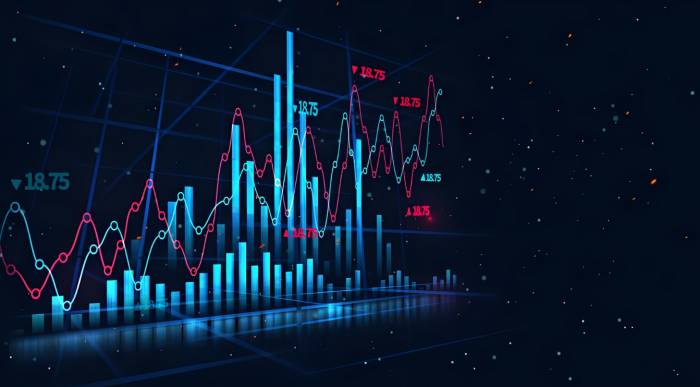After holding back for five days, thinking about the market opening every day, this is all the A-share market has to offer? The Hang Seng Tech Index in Hong Kong stocks rose by more than 7% over the two-day holiday, and this round of rebound has exceeded 20%. Today, it still managed to rise by nearly 1% despite selling pressure, while the most elastic ChiNext Index in A-shares only rose by 2%. What can I say, it did rise, but the momentum was not very strong, lacking the imposing aura of the Hong Kong stocks, slightly below expectations. It can only be said that domestic capital is too timid. Today's increase in A-shares was entirely driven by foreign capital purchases, while domestic capital was busy with high selling and low buying. Today, high-position stocks such as China's leading stocks and AI technology stocks were relatively weak, and the main leaders were low-position core assets.
The main driving force behind the rebound of A-shares and Hong Kong stocks in the past two weeks comes from foreign capital replenishing positions. As for the reasons for foreign capital to replenish positions, there are expectations of stronger domestic economy than expected, improved real estate expectations, and foreign capital adding positions to A-shares, Hong Kong stocks, and other RMB assets for risk aversion or portfolio rebalancing. Everyone is familiar with the style of foreign capital. When they add positions systematically, they usually buy leading stocks with one click, such as the internet in Hong Kong stocks and core assets in A-shares. Most of these stocks have gone through three years of bear market adjustments and are at a historical low. The purchase of core assets and low-position style by foreign capital has formed a resonance, promoting the catch-up of low-position stocks or the valuation repair of core assets. Therefore, we have also seen obvious high-low switches in both Hong Kong stocks and A-shares.
Therefore, for the future market, whether foreign capital can continue to flow in is the key. Although most of the foreign capital inflow in recent times is hedge funds and other trading-type funds, long-term configuration funds have also begun to flow in. At present, the proportion of foreign capital's allocation to Chinese assets is still at a historical low, and there is a large potential for adding positions objectively. However, whether foreign capital will continue to add positions subjectively depends on domestic policies and the Federal Reserve's interest rate cut node. We believe that the Third Plenary Session in July is the bottom line for the market, which is a major policy expectation. The market can continue to speculate as long as the meeting is not implemented. It is difficult to say whether there will be a major market, but there is basically no major callback risk. Even if it is a structural market, there will be sectors that become the main line.
After a simple analysis of the market, let's look at today's heavy market:
Price increase market

Today, the "price increase market" is a main line. In April, the continuous rise of gold, crude oil, and copper brought a big color market, which is well-known and need not be mentioned.
In addition to mainstream commodities such as gold and crude oil, there are also price increases in many sub-sector commodities. For example, in March 2024, a 70,000-ton TMA factory in the United States was reported to have exploded, resulting in a sharp decrease in market TMA production and a continuous rise in prices, driving the A-share related sectors to soar. Zhengdan shares have already increased tenfold.Additionally, tungsten, ferromanganese, and liquid chlorine have also seen significant increases, with China Tungsten High-Tech hitting the daily limit, and the chemical sector showing strong performance.
Major Announcement from the National Development and Reform Commission
Recently, Zheng Shanjie, the head of the National Development and Reform Commission, chaired the second special symposium on large-scale equipment renewal and consumer goods replacement, where he exchanged views with private enterprise leaders such as Tianneng Holding Group, Xizi United, United Imaging Group, and Kangli Elevator. He attentively listened to the entrepreneurs' demands and suggestions regarding the large-scale equipment renewal work and had an in-depth discussion on promoting the next steps of related tasks.
Wuhan Introduces Real Estate Policies
Today, the Housing Security and Housing Administration of Wuhan City issued the "Notice on Further Optimizing and Improving Policies and Measures to Promote the Stable and Healthy Development of the Real Estate Market in Our City." The policy includes ten measures, such as strengthening the housing provident fund loan, adjusting the standard for recognizing the number of loans for the first home purchase by a family, introducing a new "sell old, buy new" transaction model, and optimizing the management of the "white list" for real estate development enterprises.
As of the market close, the Shanghai Composite Index rose by 1.16%, the ChiNext Index by 1.98%, the Hang Seng Index by 0.34%, and the Hang Seng Tech Index by 0.73%. The total turnover of the two markets expanded to 1.1 trillion, with net purchases of 9.316 billion by Northbound capital, more than 4,500 companies rising, more than 100 companies hitting the daily limit, and nearly 70 companies hitting the lower limit, mainly ST stocks.

Comments